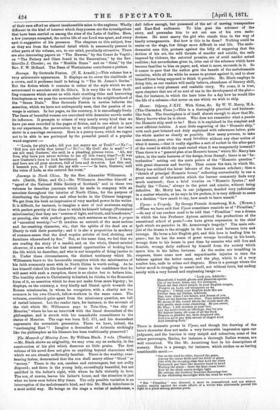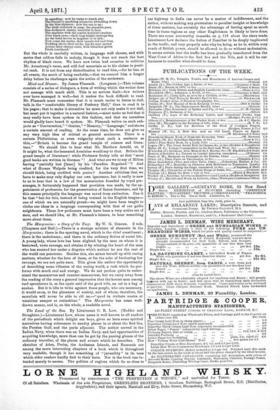Ugone: a Tragedy. By George Francis Armstrong, B.A. (Moxon.) —When
we have said that Ugone sometimes reminds us of "Firmilian," —do any of our readers need to be told that "Firmilian" was a drama in which the late Professor Aytoun satirized the productions of the sensational school of poets ?—we have given expression to the chief fault which we perceive in Mr. Armstrong's tragedy.* The main sub- ject of the drama is the struggle in the hero's soul between love and revenge. Ho loves a fair English girl, and this love is leading him to peace ; but he has the sense of great wrongs brooding in his heart, wrongs done to his house in past time by enemies who still live and flourish, wrongs daily suffered by himself from the society which spurn him in his fallen fortunes. As the scales are trembling in suspense, there come new and unpardonable injuries to turn the balance against the better cause, and the play, which is of a very sombre hue, ends in crime and disgrace. Here is a passage where the better mood is struggling to assert itself, not without force, but ending surely with a very forced and nnpleasing image:— "Look you, Adelaide:
Henceforth I banish ghosts and phantom-specks Out of my heart, brain, eye, for evermore. Teach me that sweet prayer, in your English tongue, 'Forgive us, Lord, our trespasses as we Forgive : ' I think your English finds His ear Swifter than my Italian, Adelaide. Nay, love, when I am hence, and dream of you, Then all my heavens are clear. Turn hitherward, My moon of life, round whom the clouds melt off, And gentle stars come clustering. Be you sweet, My Dian: I will worship at your feet, Lay my soul's fruits as offerings, slay for you My dearest hates, till none of all the flock Remain to gladden me, their shepherd vile, And you grow gay with savour of singed wool And steaming flesh."
There is dramatic power in Ugone, and though the drawing of the hero's character does not make a very favourable impression upon our judgment, and the heroine is very insipid and colourless, some of the minor personages, Marina, for instance, a thorough Italian woman, are well conceived. We like Mr. Armstrong best in his descriptions of scenery. Here is a passage, for instance, which strikes us as having considerable merit :— " Out on the road he rides, beyond the gates, Among the maize fields and the fields of grass Girt with the trooping elms that hold the vines Festooned, gay lines like dancers hand in hand Waiting the music ; there the kine roam loose: Now by the thick acacia-hedges light
He sweeps, the feathery branches fluttering free In the whitening moonlight with the wind he wafts • But " Firmilian " was directed, it must be remembered, and not withou justice, mainly against the crude efforts of a writer who afterwards proved his right to a place among genuine poets.
In speeding; now he turns to watch afar The Duorao's sparkling pinnacles dwindling down In the blue distance: now the sun is up; The birds outbreak in song; the peasants pass, Sun-darkened, stately, beautiful in face, The maidens with the scarlet kerchief-swathes Over black eyes,--their long bright earrings flap As the head moves in laughter or in talk ; Now come the mules, their tassels red and blue, Nodding above their necks, the fly-nets spread Across their sheeny coats, with branches green Fresh interlaced."
But the whole is carefully written, in language well chosen, and with metre that seldom fails in melody, though it does not reach the best rhythm of blank verse. We have now twice had occasion to criticize Mr. Armstrong's verse, and still feel uncertain as to his claims to poeti- cal rank. It is not from any disinclination to read him,—for he has, at all events, the merit of being readable,—that we counsel him a longer delay before he challenges again the notice of the reviewers.



































 Previous page
Previous page